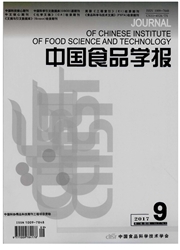

 中文摘要:
中文摘要:
分析肌肉中不同结构的蛋白含量的变化,采用SDS-PAGE考察不同溶解性肌肉蛋白质的降解情况,研究中国对虾在不同冷藏温度下(4,0,-2℃)肌肉蛋白质的降解规律。结果显示:贮藏过程中对虾的肌原纤维蛋白、肌基质蛋白含量随着贮藏时间的延长均显著下降,肌浆蛋白含量变化不大,碱溶性蛋白含量呈增加趋势。MHC(肌动球蛋白重链)、肌动蛋白和原肌球蛋白、肌钙蛋白I、肌钙蛋白C和分子质量分别为30~31 ku,6.5 ku的蛋白质均发生不同程度的降解。总蛋白中分子质量23~25 ku的蛋白,水溶性蛋白中分子质量176~178 ku的蛋白,低盐溶性蛋白中分子质量67~68 ku的蛋白丰度变化与贮藏时间呈良好线性关系,有望作为中国对虾新鲜度的指示蛋白。
 英文摘要:
英文摘要:
The degradation of muscle protein of Chinese shrimp (Fenneropenaeus chinensis) during refrigerated storage was investigated by analyzing muscle protein composition and protein patterns. Changes in protein composition and patterns indicated the degradation of the shrimp muscle protein during refrigerated storage. The contents of myofibrillar protein and stroma significant decreased with storage, and the contents of sarcoplasmic protein slight decreased, while the contents of alkali-soluble protein increased during the storage. MHC, actin, tropomysion, troponin I, troponin C and the proteins of 30-31 ku, 6.5 ku showed a different degradation during the storage. The density of 23-25 ku protein band in total soluble proteins, 176-178 ku protein band in water soluble proteins, 67-68 ku protein band in low-salt soluble proteins strong correlations with storage time, so they may be the potential protein indicators of freshness.
 同期刊论文项目
同期刊论文项目
 同项目期刊论文
同项目期刊论文
 期刊信息
期刊信息
